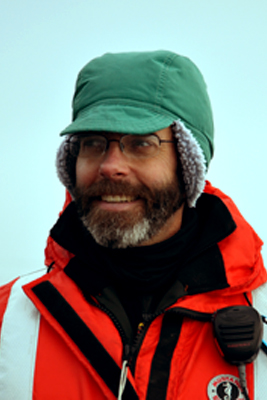Professor
3125 East Science Hall, Science & Engineering Complex
(205) 975-5622
Research and Teaching Interests: Marine Ecophysiology, Chemical Ecology
Office Hours: By appointment
Education:
- B.A., Duke University
- M.S., University of North Carolina at Wilmington
- Ph.D., University of California at Santa Barbara, Biological Sciences
I grew up along the south shore of Lake Erie with annual trips to the Atlantic coast in South Carolina and developed a life-long love of aquatic environments in general and the marine environment in particular. From a fairly early age I knew that I wanted to be a biologist working in marine ecosystems. I developed a strong interest in marine macroalgae working with my undergraduate advisor at Duke University and further developed that interest into a career focus during graduate work at UNC-Wilmington and UC-Santa Barbara.
I had my first two opportunities to do research in Antarctica as a grad student at UCSB. While I did not anticipate it at the time, a major emphasis of my research since coming to UAB in 1994 has become the chemical ecology of macroalgae and other organisms in Antarctic marine communities. We also study the influence of climate change on these communities and on individual species within them. My postdoctoral work at the University of Illinois at Chicago took me into studies of how bacteria behaviorally respond to information about their chemical environments where I learned methods and perspectives that were very important in developing my subsequent UAB-based studies of marine chemical ecology and behavior.
Dr. Amsler is no longer accepting new graduate students.
Learn More about Dr. Amsler's research in Antarctica Opens an external link.
-
Research Interests
The research that my students and I conduct is centered in several areas, but most involve chemical interactions between organisms or ways in which organisms perceive, respond to, or otherwise interact with their chemical environments. A recent extension of this work is understanding the impacts of ocean acidification and other climate change factors on marine organisms.
A particular area of ongoing interest over the past 15 years or more has been the interactions of Antarctic macroalgae and benthic invertebrates. These investigations have often involved studies of chemical defenses against predators but have also included studies of potential defenses against pathogens or fouling organisms. More recent efforts have extended this work to broader questions about the structure of Antarctic benthic communities. We are also interested in analogous questions with temperate and tropical organisms.
My laboratory also studies algal ecophysiology, often beginning with quantitative studies of the biochemistry, physiology, or swimming behavior of single cells. These algal studies start with the cell and focus in large part on physiological and behavioral adaptations to the microenvironments of the biofilm and planktonic communities. A common area of interest is the influence of nutrient and other chemical gradients on the swimming and settlement behavior of algal spores.
I am also interested in the ecophysiology and population structure of Antarctic macroalgae and microalgae. Other, previous work has included research on environmental factors governing algal seasonality, the taxonomy of filamentous brown algae, and bacterial chemotactic signal transduction.
-
Select Publications
Book:
- Amsler CD, Ed., Algal Chemical Ecology (Springer-Verlag, 2008).
- Amsler, C.D., J.B. McClintock, & B.J. Baker. 2020. Chemical mediation of Antarctic macroalga-grazer interactions. In: Gómez, I. & P. Huovinen (eds.), Antarctic Seaweeds: Diversity, Adaptation and Ecosystem Services. Springer. pp. 339-363.
- Amsler CD, M.O. Amsler, A.G. Klein, A.W.E. Galloway, K. Iken, J.B. McClintock, S. Heiser, A.T. Lowe, J.B. Schram, & R. Whippo. 2023. Strong correlations of sea ice cover with macroalgal cover along the Antarctic Peninsula: ramifications for present and future benthic communities. Elementa: Science of the Anthropocene 11 (1): 00020.
- Heiser, S., C.D. Amsler, C.J. Brothers, M.O. Amsler, A.J. Shilling, L. Bozarth, C.B. Davis, J.B. McClintock, B.J. Baker. 2022. Who cares more about chemical defenses – the macroalgal producer or its main grazer? Journal of Chemical Ecology 48: 416-430.
- Amsler, C.D., L.R. Miller, R.A. Edwards, M.O. Amsler, W. Engl, J.B. McClintock, & B.J. Baker. 2022. Gastropod assemblages associated with Himantothallus grandifolius, Sarcopeltis antarctica, and other subtidal macroalgae. Antarctic Science 34: 246–255.
